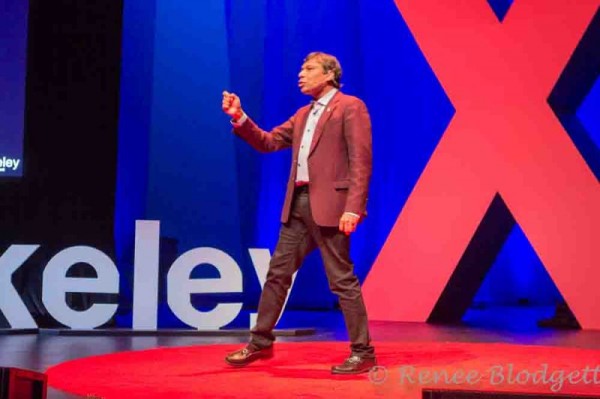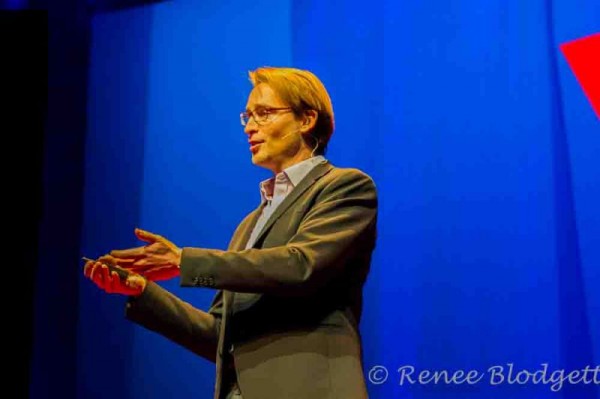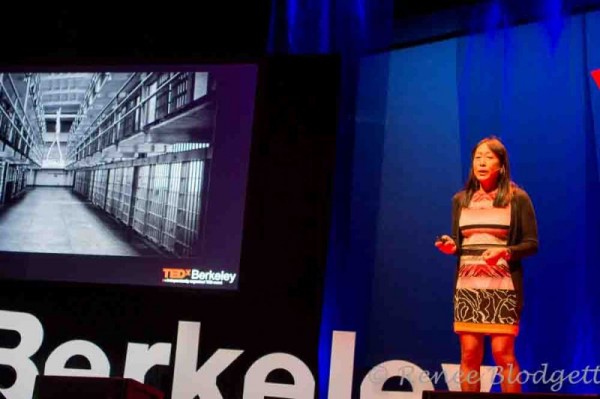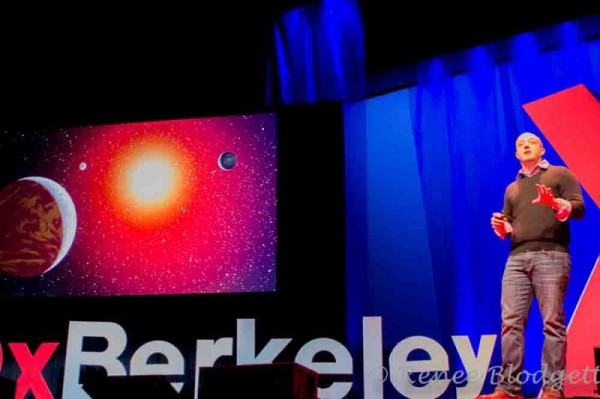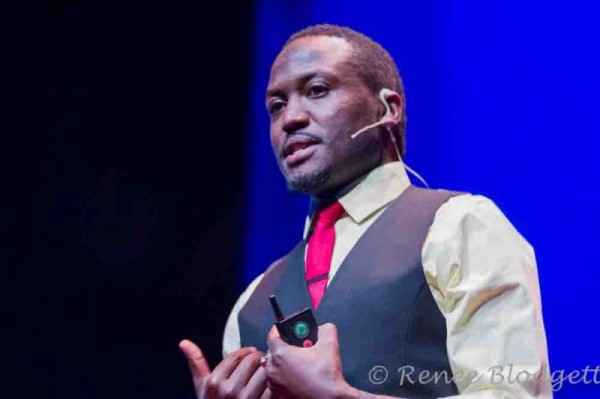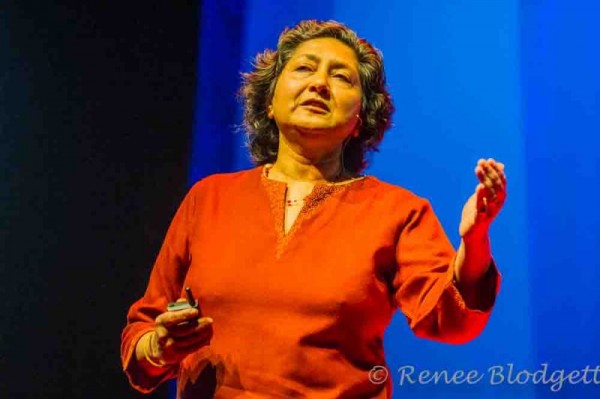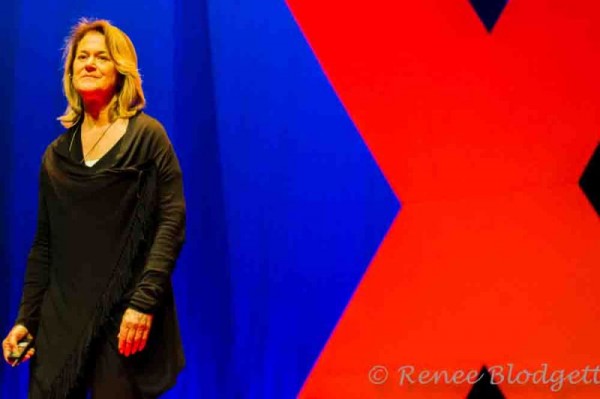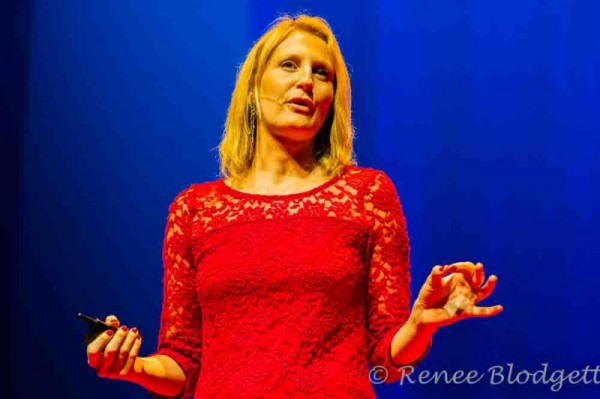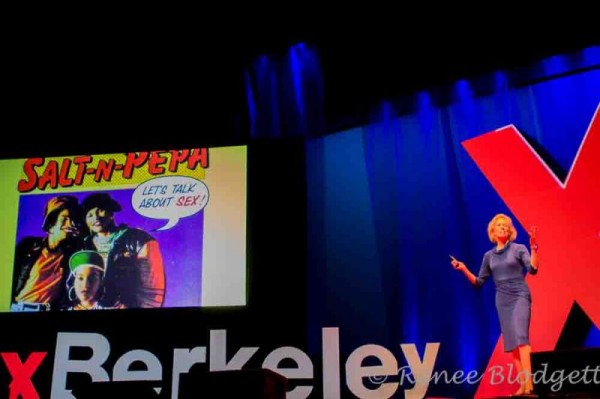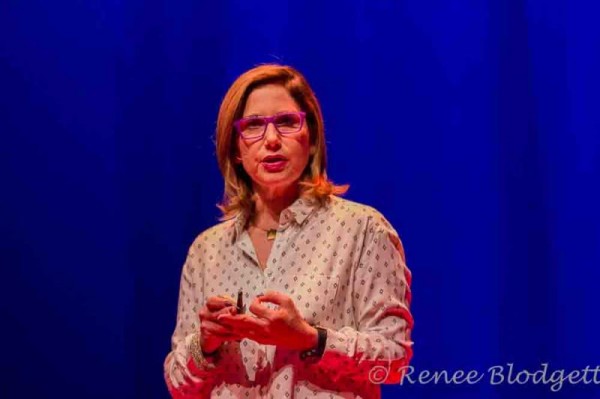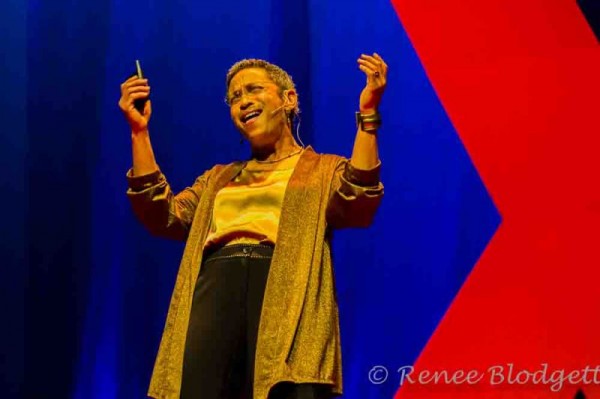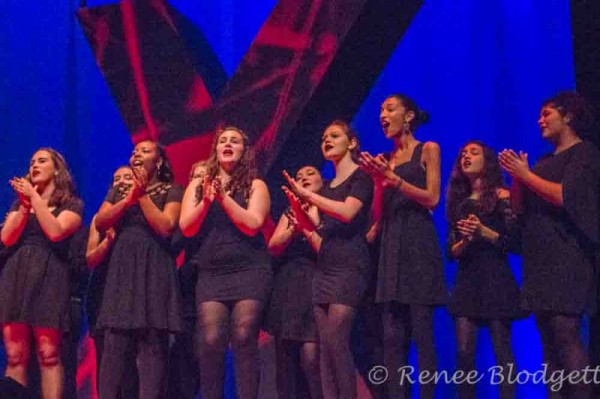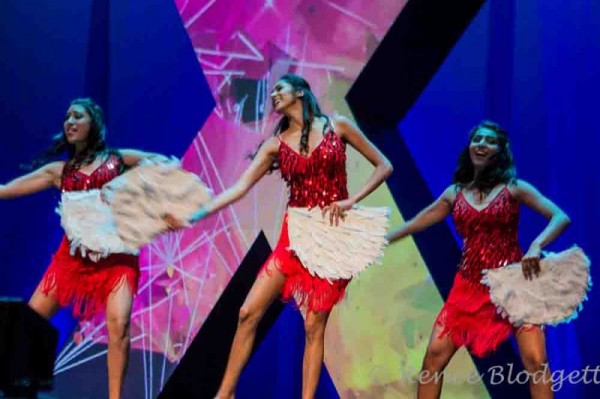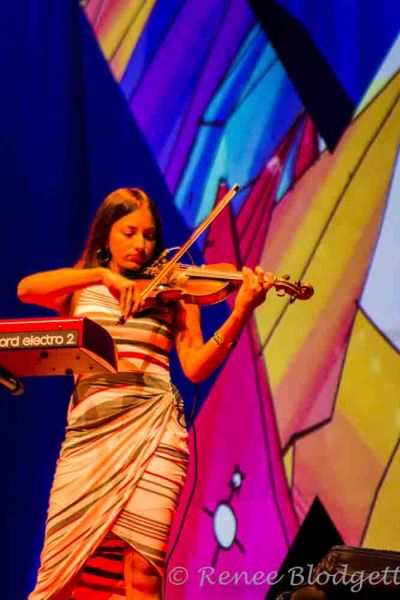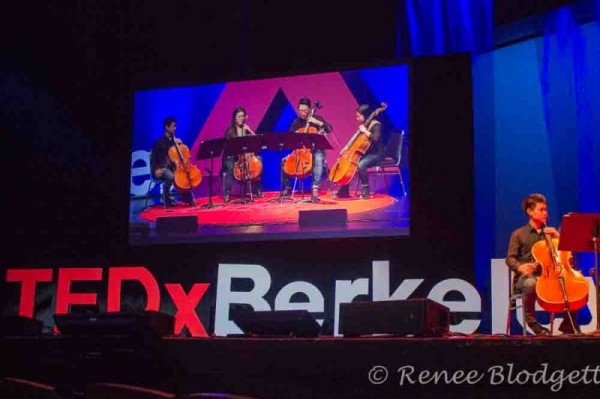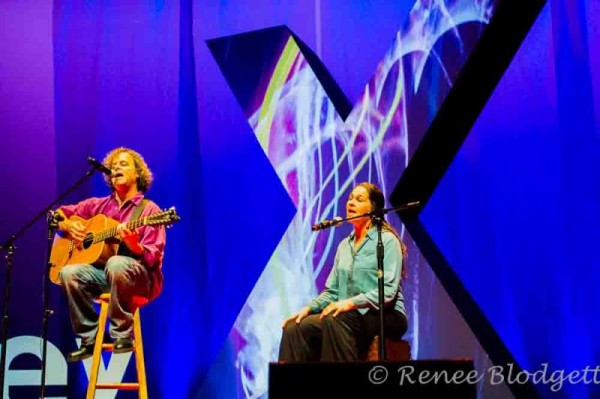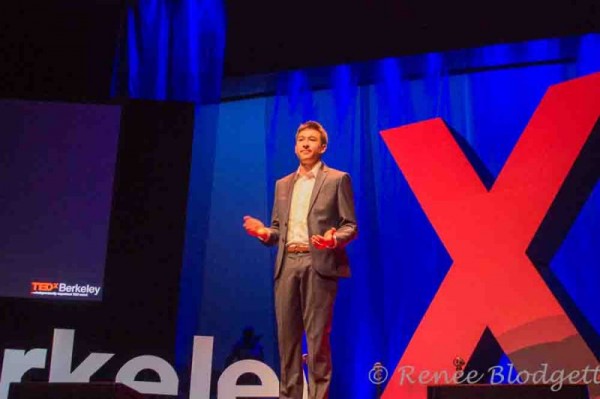I’ve been fortunate to be involved in TEDxBerkeley for six years now, a non-profit independently organized TEDx event which takes place at Zellerbach Hall every February. TEDx is a program of local, self-organized events that bring people together to share a TED-like experience and there have been close to 15,000 of them worldwide since the initiative began. Each year, TEDTalks video and live speakers spark deep discussion and connection to a pack-filled auditorium of over 2,000 attendees.
Sixteen innovative and thought provoking speakers who are trying to change the global conversation about important issues such as healthcare, gender equality, education and privacy to technology, medicine, life balance, water safety and the search for extraterrestrial life brought tears and laughter to attendees over eight hours, all of which was live streamed from their website on February 6. In between heady and emotional talks, over 50 performers hit the Zellerbach stage, ranging from Bollywood and an inspiring cello group to piano, guitar and violin tapping tunes and gospel music.
Entrepreneur and philanthropist Naveen Jain, who I’ve known for years from our mutual involvement in Singularity University, talked about the difference we can make in the world if we embrace more of an abundant mindset rather than one which comes from scarcity. This begs the question he asks, of whether in a not too distant future, it might just be as easy to travel to another planet as it is to get from New York to California.
He asserts that throughout our solar system, there is abundance and that simply by changing our mindset, we can change the playing field of what can be possible in space, in technology and even in identifying new ways to tap into important resources like fresh water. “Changing how you approach a problem changes how you solve a problem,” he says and that “it’s from that place and mindset that we can tap into our full potential.”
Rather than think about our current education system being broken which many suggest, perhaps it’s simply that our needs have changed and the existing system hasn’t adapted to meet those needs. In school, if a student gets an answer from another student, they call it cheating, but in the real world says Jain, “they call it collaboration.” The audience laughs. His belief is that a mindset of abundance can be applied to so many issues plaguing us today, including food scarcity.
Jeromy Johnson then took the stage who laid out ways we can keep ourselves and loved ones safe from the increasing emissions coming from more and more powerful cell phones and routers, cell towers popping up in front of apartment buildings, and the proliferation of smart meters in homes. Many of you may have never heard of EMF’s so may not know about the potential negative impact they could have on our bodies and minds over the long haul. Essentially, EMF’s stand for Electric and magnetic fields and are invisible areas of energy.
Jeromy who experiences health issues when near strong routers and smart meters, asserts that we should become more aware of the amount of time we spend being connected as a way to keep mind/body balance in check. He also believes that information on how to protect ourselves and reduce these fields, keeping them as far away from our heads, hearts, breasts and other vital organs as possible, should be discussed more publicly as a way for all of us to take protective measures to keep us safe, especially for children who are starting to use these devices earlier and earlier.

Photo credit from DDees.com.
Why should you care if the scientific proof is not 100% confirmed? Being trained as an engineer, Jeromy is far from a technology naysayer and was quick to praise the benefits it has provided society, however believes that we need to update our standards based on the level of exposure we have today. FCC safety guidelines haven’t been updated in almost 20 years and our exposure has grown exponentially over the past ten years.
Think about it: we have went from 2G to 3G to 4G, each with greater frequency modulation, which is a primary cause for biological effects. The ubiquity of smart phones the past seven years has also caused a massive increase in the number of cell towers in American neighborhoods. WiFi is now everywhere (including schools and churches) and has become much more powerful. Some of the latest routers now have two powerful antennas – one for your home and one for the public. Yes, your home is now a public hot spot – essentially acting as a cell tower in your living room. Add in wireless baby monitors, cordless phones, smart meters, driver-less cars, and we are creating a man-made electromagnetic soup that humanity has never experienced.
Surgeon Dr. Susan Lim is a name you may not have heard of, largely because her first and biggest claim to fame is when she broke through the gender glass ceiling in transplantation surgery by becoming the first in Asia, and the second woman in the world to have performed a successful liver transplant. It’s not the kind of thing that hits the top of your Twitter stream or your local newspaper, however her authentic and inspirational life tale of wins warmed the crowd.
A woman with a calming spirit and someone you find yourself wanting to spend more time around the more she speaks, she has also taken on philanthropic efforts with her husband through a trust which assists struggling parents to meet their children’s school expenses. The trust has also donated a science laboratory to a college and provided scholarships to underprivileged children in both Singapore and India. Rather than transplanting organs, her work has been focused on Transplanting Cells, Not Organs, a talk she has given on the main TED stage in 2011.
Her stories revolved around the successes from her work with Stem Cell Technologies, a biotech company which researches the use of adult stem cells for application in cell therapy, regenerative medicine and even for the treatment of diabetes.
Astrophysicist and director of UC Berkeley Center for Search for Extraterrestrial Intelligence (SETI) Research Dr. Andrew Siemon, is also the lead scientist for the “Breakthrough Listen Initiative”, a $100 million effort that is conducting one of the most sensitive searches for advanced extraterrestrial life in history. It’s the very same effort led by Russian tycoon Yuri Milner.
Apparently, one-third of the funding goes to funding radio telescope time, one-third to fund research and development of new receiver technology, and one-third will be used to hire astronomers. The project will use thousands of hours every year on two major radio telescopes, the Green Bank Observatory in West Virginia and the Parkes Observatory in Australia compared to only 24 to 36 hours of radio telescope time per year previously.
SETI looks at our current understanding of life’s origin on Earth, which suggests that “given a suitable environment and sufficient time, life will develop on other planets. Whether evolution will give rise to intelligent, technological civilizations is open to speculation. However, such a civilization could be detected across interstellar distances, and may actually offer our best opportunity for discovering extraterrestrial life in the near future.”
It was evident that Andrew has a clear passion for discovery and as a scientific ambassador of sorts, he educated a crowd eager to know — will we find intelligent life out there and when? What is our place in the universe: are we alone in the vast ocean of stars and galaxies? When you consider that the universe is nearly 14 million years old and our galaxy is nearly 12 billion years old, the fact that we still don’t have a significant way of detecting intelligent life makes this “Breakthrough Listen Initiative” even more compelling.
From science and space to life purpose, nano-technology inventor Christopher Ategeka took the stage to talk about his initiative that identifies early detection and monitoring of chronic diseases. He smiles wryly as he shares his childhood with us, starting with working the fields in rural Uganda and losing his parents, which led to an incredible journey which brought him to study in the United States and years later, to the Zellerbach stage earlier this month.
Motivated by his early years in Africa, Ategeka started Rides for Lives, which makes adaptive, cost-efficient vehicles in areas where they don’t have access to an ambulance. They essentially build and bring mobile hospitals to the most vulnerable in rural parts of the emerging world. A humanitarian at heart, he is also an active proponent for STEM education, entrepreneurship and innovation.
Wearing red pants, a black vest and a huge smile, he gleamed from the stage as he talked about life purpose. He reminded the audience that talent is universal, but opportunities are not and he is living proof that this is indeed the case. He closed with inspiration for the students among us as well as those who may have turned 70 and still not discovered their purpose: “Find your purpose, embed passion into that purpose and build your life around it.” I’d argue that you could still start living your life with that mindset at age 70 — it’s never too late to live your dream.
Isha Ray spoke of the downside of the fact that dignity and modesty is paramount for women in India and other parts of the world like Africa. Those two “definers”, while could also be applied to western cultures like England, don’t come in the way of access to a bathroom like they do in rural parts of the developing world. We learned the shocking truth that there are places in the world where women cannot go to the bathroom when they need to and resolve to “holding it in,” until late at night or early in the morning when they are allowed to relieve themselves in darkness. Gender quality isn’t just about making sure a woman can make it in public office, she reminds. “Gender quality means a public commitment to infrastructure.”
Ellen Leanse brought us back to gratitude and remembering the simple things in life. While we live in a time of unprecedented connectivity, our interactions with people have become more like transactions, as if those human interactions should work like technology.
Happiness and pure joy however can be found in the simplest of aha moments, she asserts, like saying “thank you” and “you made my day.” Appreciation and gratitude can become as habit forming as the best technology already has in our lives, however unlike technology, gratitude recharges our batteries so we can feel more alive and rejuvenated. Apps and drones will always be around to give us more productivity and let them do just that, but we’re humans and run on a different kind of code. We’re programmed to connect, so let’s make sure we take time to do that and not just on a social media thread or via a text message.
An authentic and telling story by Amandine Roche nearly brought me to tears. As a sufferer of Post Traumatic Stress Syndrome without even knowing it, she’s on a mission to create a wellness department at the United Nations to help people who are on the “front line,” just as she was and nowhere to turn in her time of grief and turmoil.
As a Human Rights lawyer, an invitation by the Taliban in Afghanistan changed her life. These experiences compelled her to pursue the path of peace building and conflict resolution and continue to pursue peaceful resolutions in various parts of the world including for ten years on and off in Kabul.
Amandine’s current peace building efforts focus on democracy, election, human rights, freedom of expression, education, media awareness, gender equality, and youth empowerment as means for attaining non-violence.
As CEO of the United Nations Foundation, Kathy Calvin took the stage to talk about an important issue impacting young girls around the world – sex. Talking about sex in a very real and important way and truly listening to girl’s needs early on can dramatically change the course of her life. Listening and engaging with young girls can prevent unwanted pregnancies and improve the chances of her success in the world, whether that be in rural Africa of in the United States. Globally, issues reign around gender inequality. If we really want to make a difference and contribute to humanitarian efforts, we must change the conversation about sex and take the right actions where it really counts.
Stephanie Freid, who is an International Conflicts Journalist, TV correspondent for CCTV (China) and Turkish TV International networks, reports from some of the world’s toughest conflict and war zones. She received a standing ovation for her emotional share of stories from the field, including tales from Syria. A video of this talk will be available soon so you can watch her authentically beautiful yet painful talk as well as the other 15 speakers from this year’s event.
Reverend Deborah L. Johnson, a minister and author, talked to us about forgiveness and the importance of integrating it into our lives — not forgiving puts our lives on hold if we could only realize it. Her talk was riveting and also received a standing ovation as attendees cried and laughed through 18 minutes of lessons learned, which included a narrative of a persona that everyone in the audience could resonate with. Fearing forgiveness (and fighting it) is part of being human, but letting go of that fight can bring us inner peace and a sense of joy we may have put on hold for awhile.
Deborah focuses on Universal Spiritual Principles in her life which shone through in her talk. She is also founder of The Motivational Institute, which specializes in diversity.
There were performances by Celli@Berkeley, a cellist quartet made up of undergraduate and graduate students, spoken word artists Rose Gelfand, Molly Gardner and Isa Ansari, grammy award-winning musician for the best rock song for five-time nominated “Drops of Jupiter,” Rob Hotchkiss, the OSA Chamber Choir, singer songwriter Sonia Rao who entertained us on both violin and piano, and UC Berkeley Azaad, a competitive Hindi Film Dance team which combines Rock, Swing and film with Bollywood culture in an energizing way through dance.
Below Chris Lew, this year’s TEDxBerkeley curator.

Renee Blodgett is the founder of We Blog the World. The site combines the magic of an online culture and travel magazine with a global blog network and has contributors from every continent in the world. Having lived in 10 countries and explored nearly 80, she is an avid traveler, and a lover, observer and participant in cultural diversity.
She is also the CEO and founder of Magic Sauce Media, a new media services consultancy focused on viral marketing, social media, branding, events and PR. For over 20 years, she has helped companies from 12 countries get traction in the market. Known for her global and organic approach to product and corporate launches, Renee practices what she pitches and as an active user of social media, she helps clients navigate digital waters from around the world. Renee has been blogging for over 16 years and regularly writes on her personal blog Down the Avenue, Huffington Post, BlogHer, We Blog the World and other sites. She was ranked #12 Social Media Influencer by Forbes Magazine and is listed as a new media influencer and game changer on various sites and books on the new media revolution. In 2013, she was listed as the 6th most influential woman in social media by Forbes Magazine on a Top 20 List.
Her passion for art, storytelling and photography led to the launch of Magic Sauce Photography, which is a visual extension of her writing, the result of which has led to producing six photo books: Galapagos Islands, London, South Africa, Rome, Urbanization and Ecuador.
Renee is also the co-founder of Traveling Geeks, an initiative that brings entrepreneurs, thought leaders, bloggers, creators, curators and influencers to other countries to share and learn from peers, governments, corporations, and the general public in order to educate, share, evaluate, and promote innovative technologies.


